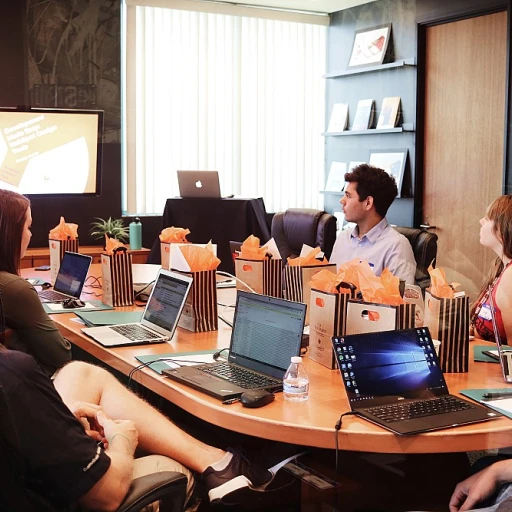
Understanding Candidate Experience
The Essence of a Strong Candidate Experience
The candidate experience is fundamental to attracting top talent and enhancing your company's reputation in the competitive hiring landscape. It encompasses every touchpoint and interaction a potential new hire has with an organization—before, during, and after the application process. Ensuring a strong candidate experience not only supports effective recruitment but also fosters positive employer branding. Candidates today expect a seamless journey; their experience can often determine whether they recognize a company as an employer of choice. Organizations must pay close attention to the details of this journey because it impacts both their ability to attract new talent and the overall perception in the job market. Additionally, a well-managed process enhances the chances of securing high-caliber employees who can drive business success. Candidate experience management can benefit from process improvement strategies centered around best practices. Businesses can optimize their recruitment processes through service management techniques and consulting services that focus on ongoing development. Moreover, utilizing data analytics and software solutions can help organizations continually refine their approach and remain competitive. Integrating business process management (BPM) insights, organizations can streamline recruitment efforts, creating efficient and effective candidate journeys. This often involves close collaboration with process consultants who bring specialized consultancy expertise to the table. By leveraging their solutions, companies can focus on long-term benefits and ensure they are continually aligning their recruitment processes with industry standards. Ultimately, the candidate experience should reflect the broader organizational values and goals, aligning with strategic talent acquisition plans. For more insights on crafting a robust employer branding strategy to attract top talent, consider exploring this resource that dives deeper into the elements of successful employer branding.Role of Process Consultants
Consultants as Key Players in Enhancing the Experience
Candidate experience is undeniably a crucial component in the recruitment spectrum, influencing how potential hires perceive a company's brand. Herein lies the pivotal role of process consultants, who excel in evaluating and optimizing business processes. Consultants bring a unique blend of expertise in process management and business optimization, providing invaluable insights to organizations looking to improve their candidate experience. They examine existing recruitment processes, identify bottlenecks, and suggest actionable strategies to streamline operations. Their strategic approach helps to convert prospects into lasting relationships with the company. Strategic Insight and Guidance Process consultants guide organizations through transformative business process improvement, focusing on enhancing touchpoints in the candidate journey. With comprehensive service management skills, they work alongside internal teams to design solutions that improve operational efficiency without sacrificing personal engagement. Their consultancy services also involve a considerable emphasis on data collection and analysis. By leveraging data, these experts help companies develop metrics and KPIs that ensure long-term improvements, rather than temporary fixes. This holistic approach allows companies to measure progress effectively and make informed decisions. Integration with Technological Solutions In the digital era, technology stands as a core enabler of process transformation. Consultants align technology with business goals, recommending appropriate software developments and bpm solutions to support and enhance candidate experience strategies. This is where process optimization intertwines with digital solutions, setting the stage for a seamless recruitment journey. For companies in the process of digital overhaul, process consulting provides a phased approach to implementing BPM software, ensuring minimal disruption and optimal adaptation by internal teams. In essence, the contributions of process consultants transcend traditional consultancy, as they immerse themselves into the intricacies of business processes, helping organizations not only survive but thrive in a competitive talent market. For more insights into the multifunctional role of a consultant in this setting, dive deeper here.Common Challenges in Candidate Experience
Addressing Challenges with Strategic Approaches
Candidate experience is a multifaceted area that can present several common challenges for organizations during the hiring process. These obstacles can undermine efforts to attract and retain top talent if not adequately addressed. One major challenge is the inconsistencies in communication, which can result in candidates feeling left in the dark about the status of their application. Lack of timely responses or unclear messaging gives candidates a negative impression of the company's organization and management. Moreover, complex or prolonged hiring processes can lead to frustration and drop-offs, necessitating a streamlined approach with clear expectations. Another issue is the bias that can inadvertently creep into recruitment processes. Without intentional planning and *process optimization*, biases—conscious or unconscious—might affect decision-making, thus impacting diversity and fairness in hiring. Companies should strive to create an inclusive environment by implementing unbiased recruitment strategies. Moreover, gathering and acting on feedback is often a missed opportunity. Process consultants can *support organizations* by developing systematic methods to collect candidate feedback, analyze it, and implement meaningful changes, thereby improving overall candidate experience. Employing the right *business software* and tools to manage applications and communications can play a crucial role in solving these challenges. Data-driven insights provided by *BPM consultants* can help companies refine their practices and align them with *industry best practices*. For more insights on understanding potential red flags during recruitment processes, you might find this resource helpful.Strategies for Improvement
Maximizing Efficiency and Effectiveness in Candidate Experience Programs
To enhance candidate experience, organizations often engage with process consultants who offer valuable insights and expertise. These consultants play a pivotal role in diagnosing existing business processes and identifying areas of improvement. By leveraging their comprehensive knowledge of service management and business process management (BPM), they help refine recruitment strategies, making the hiring journey smoother and more engaging for candidates.
Implementing strategies for improvement in candidate experience involves both immediate fixes and long-term measures. Here are key areas where process consulting can drive significant enhancements:
- Process Optimization: Consultants specialize in streamlining processes to minimize redundancies and inefficiencies. This ensures that the recruitment process is seamless, from initial contact to onboarding. Optimization not only speeds up the hiring timeline but also improves the overall experience for candidates.
- Data-Driven Solutions: With expertise in data analysis, consultants provide organizations with actionable insights. Examining recruitment metrics helps companies understand candidate touchpoints and adapt their strategies to better meet candidate expectations.
- Technology Integration: Incorporate cutting-edge software solutions that enhance candidate interactions. Whether it is through AI-driven chatbots or advanced applicant tracking systems, process optimization ensures that technology supports and improves engagement at every recruitment stage.
- Standardizing Best Practices: Consultants help in consolidating best practices across different departments and teams. Standardization leads to a consistent and predictable candidate experience, reducing confusion and increasing candidate satisfaction.
- Scalable Solutions: As organizations grow, their recruitment needs also evolve. Process consultants develop scalable solutions that adapt to the changing business landscape, ensuring that candidate experience remains a priority regardless of company size or industry demands.
By focusing on these areas, organizations can make significant strides in improving their candidate experience. Engaging with seasoned consultants ensures that the strategies implemented are not only practical but also aligned with industry standards, ultimately leading to a successful blend of efficiency and engagement in the recruitment process.
Technology's Impact on Candidate Experience
Integrating Technology in the Candidate Journey
The rapid evolution of technology has profoundly transformed the way companies manage their candidate experience. Businesses today leverage a range of tech-driven solutions to streamline and enhance their recruitment processes. This shift towards digital integration is not just about keeping up with industry trends, but also about providing a seamless experience for potential hires. One of the primary tools aiding this transformation is applicant tracking software (ATS). These platforms aid in managing the recruitment pipeline by enabling the tracking of candidate progress, organizing resumes, and facilitating communication. By automating repetitive tasks, ATS provides support to hiring managers, allowing them to focus on building relationships with candidates rather than administrative tasks. Additionally, business process management (BPM) software offers companies further insights into optimizing their recruitment strategies. By analyzing data, BPM solutions help in identifying bottlenecks and inefficiencies within the hiring process. This form of process optimization ensures a more coherent and timely candidate experience, which is increasingly becoming a critical factor for attracting top talent. Virtual interviews, powered by video conferencing technologies, have also become a norm, especially in the United States. They offer organizations the flexibility to connect with candidates regardless of geographic constraints, thereby extending their talent pool. This adaptability not only benefits companies but also caters to candidates seeking a dynamic, tech-savvy approach. Furthermore, AI-driven tools are being employed to personalize the candidate experience. From chatbots providing instant responses to inquiries, to algorithms that match candidates to suitable roles, AI facilitates a more engaging and relevant interaction. This application of artificial intelligence is particularly valuable in service management, ensuring that communication is swift and accurate. Lastly, integrating technology into the recruitment process isn’t limited to large multinational corporations. Small and medium-sized enterprises are also benefiting from process consulting services that offer tailored software development solutions. By embracing these tools, companies can enhance their employer brand and ensure that their candidate management persists as a well-oiled machine. Technology's impact on candidate experience cannot be overstated. It assists not only in managing business processes but also in fostering a positive perception of an organization’s efficiency and innovation. The future of candidate experience undoubtedly lies in the continuous development and integration of these technological solutions.Future Trends in Candidate Experience
Emerging Trends Shaping Candidate Experience
The evolving landscape of candidate experience is closely intertwined with the advancements in business processes, software development, and process management. As the industry continues to innovate, new trends are shaping how companies approach the recruitment and onboarding processes, enhancing both efficiency and satisfaction for potential employees.
One prominent trend is the increasing adoption of AI-powered recruitment tools. These tools help organizations streamline their processes, offering more personalized and efficient communication with candidates. By leveraging data and advanced algorithms, businesses can improve their understanding of candidate needs and tailor their approach accordingly.
Moreover, the integration of business process management (BPM) solutions is becoming more prevalent. BPM consultants are playing a crucial role in optimizing recruitment processes, ensuring that every touchpoint in the candidate journey is smooth and effective. This focus on process optimization not only supports better service for candidates but also aids in achieving long-term organizational goals.
Another significant trend is the growing emphasis on remote interviewing and virtual onboarding, driven by the widespread shift to remote work. Companies are investing in services and software that support virtual interactions, which have become an essential part of the recruitment strategy. These developments reflect the broader industry movement towards flexible work environments.
Additionally, data-driven decision-making is taking center stage in candidate experience management. Organizations are increasingly relying on analytics to guide their recruitment strategies, from identifying skill gaps to predicting candidate success. This shift towards a more analytical approach is helping companies make informed decisions, benefiting both the business and its potential employees.
As we look to the future, companies that embrace these emerging trends and integrate them into their business processes will likely lead the industry in providing superior candidate experiences. By staying ahead of technological innovations and focusing on continuous improvement, organizations can build strong, efficient, and candidate-centric recruitment processes.













